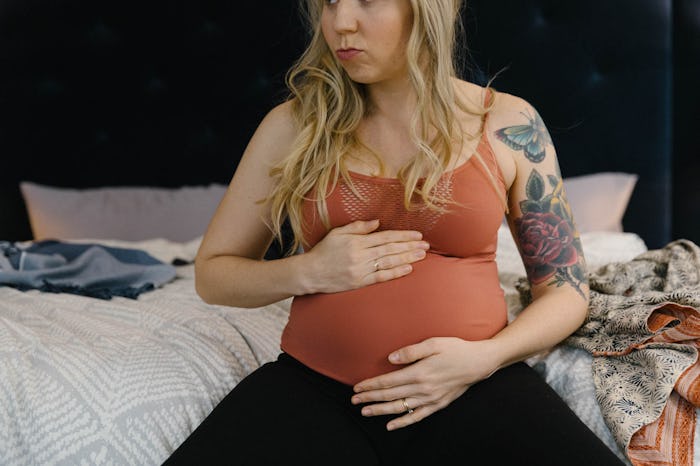With each bit of excitement and joy during pregnancy, there seems to be about a million side effects. When you first find out you’re pregnant, you begin a love/hate relationship with Google and baby forums. It’s normal to be curious and wonder what the heck is going on in your body, because it sure is changing — and changing fast — and nothing is more obvious than when you're hit with a dizzy spell. It's common to experience them, but they can make you want to ask Dr. Google, "why do I feel dizzy during pregnancy?"
Most women feel dizziness in their first trimester, and it’s a pretty common and normal symptom, says Dr. Sherry Ross, a women’s health expert at Providence Saint John’s Health Center in Santa Monica, California. "Dizziness in the first trimester is a common sign of pregnancy due to the hormonal changes," Ross tells Romper in an email. "It happens as a result of all the hormonal, blood volume, structural, and blood sugar fluctuations throughout pregnancy. Some of these changes ultimately affect your blood pressure, which can reduce blood flow to the brain and cause bouts of dizziness"
Suzanne Munson, M.S., a natural health expert for Fairhaven Health, says in an email to Romper, "It’s often that first dizzy spell that gives a woman a hint that she should take a pregnancy test. During pregnancy, the levels of the hormone progesterone rises," she says. "Progesterone relaxes the walls of blood vessels, which causes them to dilate, which in turn causes your blood pressure to drop — this can lead to dizziness and even fainting spells."
Both Munson and Ross say that dizziness can occur throughout the entire pregnancy as well, for different reasons. Ross says, "If you spend a lot of time lying on your back after 20 weeks, you may experience dizziness since less blood flow will go to and leave the heart. In the third trimester, it’s common to feel dizziness as a result of abrupt movement due to all the blood volume changes." Munson adds that in the later stages of pregnancy, "dizziness can be caused by your growing uterus, putting pressure on adjacent blood vessels."
If you’re feeling dizzy, you should also be sure to check your iron levels, because women with lower levels of iron tend to experience dizziness more than women with "normal" iron levels. Thankfully, as long as you don’t fall and your dizziness isn’t related to not getting enough calories or nutrients, experiencing dizziness during pregnancy shouldn’t affect your baby.
But be sure to keep up your food intake. "When you have not eaten regularly, your blood sugar levels drop, [which] can cause dizziness," Ross says.
According to Munson, if one of those dizzy spells strikes, you should find some fresh air and "a place to sit or lie comfortably with your head down until the dizziness passes."
So how can you prevent dizziness while pregnant? Unfortunately, you won’t be able to completely prevent it from happening, since it’s usually hormone-related. (And you and I both know that hormones are out of control when you’re pregnant.) However, both Munson and Ross say that some things you can do to help include staying hydrated, taking a daily prenatal vitamin with iron, and always getting up slowly from sitting or lying down.
Additionally, both recommend that you avoid standing for long periods of time. But if you do have to stand for a long time, Ross suggests wearing T.E.D. compression stockings ($8) to help the blood circulation in your lower legs. To prevent low blood sugar, eat frequent meals and snacks every two to three hours, avoid long periods of time between meals, and you should avoid hot baths, showers or Jacuzzis.
Dizziness, among other stranger things, is a common symptom of pregnancy, so try not to go crazy by obsessively reading baby forums and asking Dr. Google. If you do have questions and concerns, it’s always best to check in with your OB-GYN or midwife. Listen to your body, take care of yourself, and you should be just fine.
